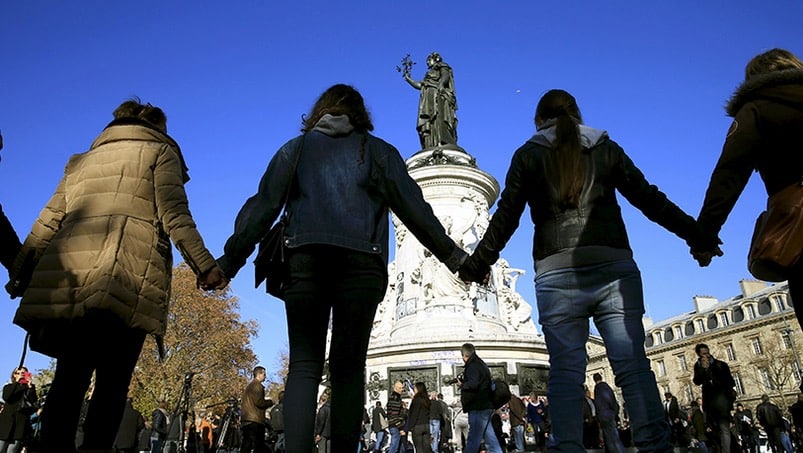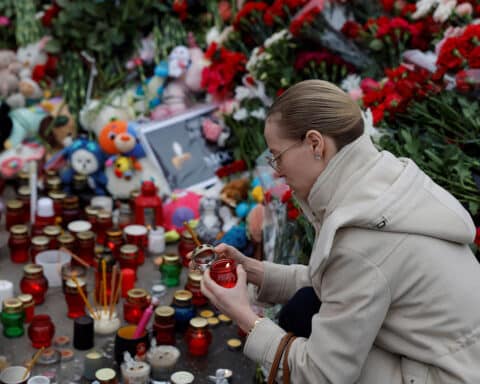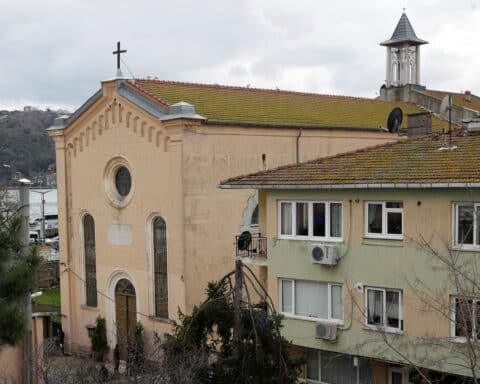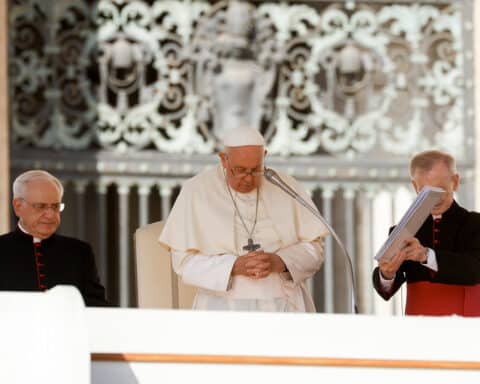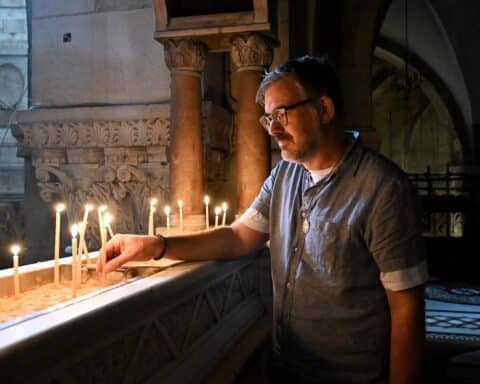The brutal and barbaric acts of violence against innocent civilians in Paris have left us struggling with various emotions: outrage, anger, sorrow and fear. Although the acts of terror occurred in France, those murdered were doing what many Americans do on Fridays nights: attending a concert, going to a sporting event or meet friends for dinner. How are Catholics to respond to such acts of terrorism? The reactions of Pope Francis and other Catholic leaders have given us some good examples to follow, which can be summarized as follows:
Solidarity and prayer
The very first response should be an expression of solidarity or closeness with the victims of the violence. Very soon after learning of the terrorist attacks in Paris, Pope Francis said: “I am close to the people of France, to the families of the victims, and I am praying for all of them.” After his Angelus address on Nov. 15, the Holy Father invited those present at St. Peter’s Square and those listening around the world to join him in entrusting the defenseless victims of the tragedy to the mercy of God. In a special way, he called upon the Virgin Mary “to protect and watch over the beloved French nation, the eldest daughter of the Church, along with all of Europe and the whole world.”
Condemn evil
The killing of the innocent, whatever the motivation, must be absolutely and unconditionally condemned. Pope Francis described the terrorism in Paris as “an unspeakable attack on the dignity of the human person.” He reaffirmed with vigor his conviction that “the path of violence and hatred does not resolve the problems of humanity.” Moreover, “the use of God’s name to justify this path is a blasphemy.” The Holy Father was repeating here the strong language of the 2004 Compendium of the Social Doctrine of the Church, which teaches that “it is a profanation and a blasphemy to declare oneself a terrorist in God’s name” (No. 515). Pope St. John Paul II spoke in similar terms in his message for the 2002 World Day of Peace: “No religious leader can condone terrorism, and much less preach it.”
Avoid hatred
| Muslim leaders respond |
|---|
|
Immediately after the terrorist attacks in Paris, many Muslim leaders, organizations and countries issued statements of condemnation. King Salman of Saudi Arabia sent a cable to French President François Hollande expressing his country’s condemnation of “this repugnant terrorist attack,” and he offered condolences “to the French people and the families of the victims.” The highest religious body of Saudi Arabia issued a statement saying that “terrorists are not sanctioned by Islam,” and it urged a worldwide “unified moral stance” to eliminate terrorism. Similar condemnations of the terrorist acts in Paris came from the UAE, Kuwait, Qatar, Egypt and Iran. The day after the attacks, the Islamic Society of North America released a statement saying, “We strongly condemn the terrorist attacks in Paris. No religious tradition can ever justify or condone such ruthless and senseless acts of violence.”
|
The horrific scenes out of Paris, along with other acts of terror, can easily lead us to be consumed with anger and hatred toward those who carried out these crimes. In a statement issued the day after the attacks, Archbishop André Vingt-Trois of Paris prayed for “the grace of a firm heart, without hatred.” He appealed to the French faithful not to indulge “in panic or hatred” and to continue in the path of “moderation, temperance and control.” Because the terrorists were allied with the Islamic State and invoked Muslim sayings, the temptation to give into feelings of anger or hatred toward Muslims must be resisted.
This past March, Louis Raphaël I Sako, the Catholic Chaldean Patriarch, made an urgent appeal at the United Nations to form a coalition to defeat “the Islamic extremist groups” who are persecuting and killing non-Muslims in Iraq and uprooting them from their homes. He made it clear, though, that “these terroristic acts should not be generalized to all Muslims. In fact, there is a silent and peaceful majority of Muslims that reject such politicization of the religion; they are accepting to live a common life with others within the civil state and according to the law.”
It’s particularly sad that these acts of terror committed by Islamic extremists came a few weeks after the 50th anniversary of Nostra Aetate, the Vatican II’s Declaration on the Relation of the Church to Non-Christian Religions. This 1965 declaration states that the Church looks upon Muslims “with esteem” and recognizes that “they adore the one God, living and subsisting in Himself; merciful and all-powerful, the Creator of heaven and earth.” Nostra Aetate also called upon Christians and Muslims to work together for social justice, moral welfare, peace and freedom. These words of Vatican II continue to inform the Catholic hope that most Muslims wish to join in the fight against the terrorism of the Islamic State. While some dismiss this as naive, Pope Francis has consistently reached out to Muslim leaders to collaborate in the battle against ISIS and other terrorist groups. During his November 2014 apostolic visit to Turkey, the Holy Father addressed Turkish religious leaders saying: “As religious leaders, we are obliged to denounce all violations against human dignity and human rights. Human life, a gift of God the Creator, possesses a sacred character. As such, any violence which seeks religious justification warrants the strongest condemnation because the Omnipotent is the God of life and peace. The world expects those who claim to adore God to be men and women of peace who are capable of living as brothers and sisters, regardless of ethnic, religious, cultural or ideological differences.”
Support peacemakers
The Catholic Church is a universal religion. Our Church reaches beyond the special interests of the United States or any particular country. In this regard, the Church recognizes that there are groups and nations motivated by violent ideologies that can only be resisted by military means. The Catechism of the Catholic Church in paragraphs 2243 and 2309 lays out the traditional requirements for a “just war.” On this point, however, the Church urges the cooperation of the international community for addressing serious threats to peace and stability. Vatican II’s Pastoral Constitution on the Church in the Modern World, Gaudium et Spes, affirmed the need for international cooperation “in view of the increasingly close ties of mutual dependence today between all the inhabitants and peoples of the earth” (No. 84). The terrorist attacks in Paris remind us that we are dealing with a worldwide structure of ideological violence. Pope Francis sees what is happening as a piece of the “piecemeal Third World War.” This is a war that must involve international cooperation and goodwill on the part of people of different faiths and nations.
Trust in Christ
We understand as Catholics that this is a war that must be fought with spiritual and not merely military weapons. St. Paul reminds us that “our struggle is not with flesh and blood but with the principalities, with the powers, with the world rulers of this present darkness, with the evil spirits in the heavens” (Eph 6:12). The powers of darkness have inspired many ideologies of violence throughout world history. We must not give in to hatred, anger, or despair. We must stand firm “girded in truth, clothed with righteousness” (Eph 6:14). We must call upon the powerful intercession of Mary, the Queen of Peace, and find hope in the words of Christ: “In the world you will have trouble, but take courage, I have conquered the world” (Jn 16:33).

